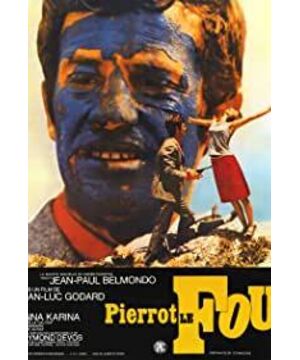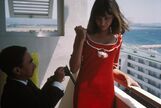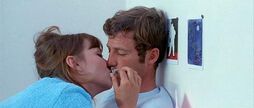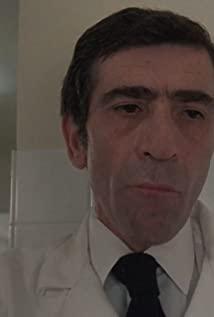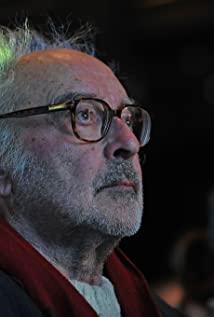UFO. The image of these five words is this movie - "Pierro the Madman". It drifts lazily, flickering from east to west, and neither wind nor gravity is its limit. It's light and airy, unencumbered by any responsibility. It floats in the sky, frivolous and almost transparent. It didn't know what to do, its mouth was wide open, and its eyes were naive and blank.
If, while I was writing the first few sentences, a UFO suddenly floated in the sky outside the window, I would immediately stop it: "HEY! UFO doing nothing!" It would definitely look back in surprise, because it came from After eating breakfast, he glided in the sky, and no one paid attention to it, and of course no one said that it was doing nothing. It's not there waiting for my next words. I organized the following language: "You don't have a shell, you don't eat, you don't have a backpack. Can you carry love?" It would have a sluggish reaction time for a while—because no one had ever asked a question like that, and then something like Like Bugs Bunny in the cartoon, he was embarrassedly aware of the gravity of the earth and his own weight, and fell diagonally, with the acceleration of gravity. At this time, I took advantage of the sloping taxi line before it disappeared, and quickly made a wish - in fact, this is my purpose.
Ha ha. My wish was to find Anna Karina in the movies. Like Pierrot, I'm going to spend some undisturbed time with her, we'll wander aimlessly, singing, driving the convertible into the sea, tanning on the beach, and then she'll be in mine Die on hand. By then, I blew myself back into the real world.
Is this a dream talk? Pierrot said: "Maybe I'm daydreaming... We're in the age of two-faced people, where we don't need mirrors to talk to ourselves. We're all made up of dreams, and we make up dreams. "have what? I like this dream.
In the few days before watching this movie, I could hardly get rid of the foggy state in my sleep. Can the shape be solid like a tree, but the heart can be like dead ashes? So I watched Pierrot the Madman, I watched the DVD on the CC version, and in addition to the movie, there was more than an hour of extras, plus a commentary track by Jean-Bernard Bowie. I watched it over and over again. From noon until night, the scorching sun outside the window slowly drew to a close, and the scene changed into a sky full of stars and a satin-like night. From the playground came the sound of basketballs hitting the ground, and their echoes. Between the sound, it seems that the vast years are separated. He was in a trance, as if he was in a dream.
It's a story of red and lake blue—the two colors in the film's subtitles and bits and pieces on the set. Red and blue in the French flag mean freedom and love respectively. The film is an anarchist free poem about the feelings of Pierrot and Marianne. Is that love? Maybe not. The film basically tells the story of Pierrot (who always called himself Ferdinand), fed up with his poor life, returning home one night from the troubled high-class party at his parents-in-law's house to find that Marianne, who had been brought in to look after the children, was old acquaintance. So he ditched everything and started a wild, romantic and idle journey with Marianne, their journey naive and exciting, as if time didn't exist for them. Marianne flew over the walls like a little bird, and her feet touched the ground lightly. Nothing could make her watch the water flow quietly. Pierrot is not a nesting bird, but he still has his selfishness. He wants Marianne within reach, he doesn't want a cage, but he doesn't want Marianne to break through his selfish red line. And Marianne still flew over the top of the wall, and her feet touched the ground... In the end, he shot Marianne, and Marianne fell down and fell into his arms. He felt that Marianne was still heavy, and his arm felt heavy. Shen. He regrets. He is tough. He said to Marianne, "You shouldn't do this." The
movie seemed to have a plot in my narrative. I should realize that Godard was never a storyteller: "Everyone else tells a beginning, then a middle, and then an ending...I feel very uncomfortable with this kind of thing, I've never managed to start all over again. Tell a complete story at the end."
I feel like my narrative above spoils the movie. I tampered with it - in fact, the film is just a combination of fragments, the fragmented fragments of the film are free and unfettered by the clues of the plot. Its purpose is flat, and the purpose of the plane means no directionality, it has no tendency to move in a certain direction (whether that is the direction of time travel or geographical). Important things are swept away, and the shots are not wasted on the connection between things. This film does not point from the previous shot to the next shot, but each exists on an equal footing, and each enjoys the freedom of confusion. Freedom without direction is vague, unrestrained is its appearance, and its bones are idle. Abandoning the normal narrative and disrupting the time, Godard picked out the causal relationship and the connection of all time or events from his life, and threw it away at will, so only the short poems that appeared in this film remained in the film. And the lake of placid life. —The poem must be short so that it has no temporal adventure; the lake must be calm, for Godard has removed all the montages that can lift the tension of the audience.
Godard deliberately avoided countershots, as well as interlinked montage movements. In his films, the camera's point of view is not the point of view of the almighty God, but the real point of view of the audience (although his audience is actually quite small -_-|||). He resisted Griffith and Eisenstein's rule of using editing to control the audience's emotions, and he did not play tricks of expanding and compressing time. Godard's films are not in time, to be precise, in real time outside the projection cloth. "Film time is more stretchable than actual time. Filmmakers can have their own subjectivity. This is the concept of film." After turning off the lights, the time in the theater is also turned off, and the time in the real world is turned off. Everything in the film takes place in the dark time gap and the wedge beam of the projector, which escapes in the conformal reality. Therefore, it is free.
I consider myself a young man, and I don't resist the anarchist liberty of doing whatever you want. I often think of Pierrot's line in the film: "Fortunately I don't like to eat spinach, otherwise I would have to eat spinach." - There is no obstacle between like and action, this kind of free and easy tone makes me hit. But this is actually impossible in reality. Marianne said, "That's what makes me sad: Life is never what it's written in the books. Clear, logical, organized. Not like that."
At that time, young people who were just entering the new wave of cinema were overflowing with this freedom. They are young, frivolous and unconventional. Truffaut's "Shooting the Pianist" and "Zu and Zhan," Godard's "Outlaws" and "Women Are Women," their freedom gallops lightly across the blue sky. The old Godard recalled his protagonist: "These men represent some ideal image of freedom, that is, the embodiment of the freedom to do what you want without interference, which is actually the freedom to do nothing. Since we are restricted everywhere, and we can't see the total system that governs us, we simply do nothing. Others criticize me for this purely individualistic style, others accuse me of being a People without moral values, because my attitude has always been that I neither approve nor disapprove, I just do whatever comes to my mind."
Godard's chaos of "neither approval nor disapproval" was closely related to the French intellectual circle at the time. mental state. France's "disgraceful" victory in World War II has dealt a blow to traditional liberalism; the Marshall Plan's propaganda of liberalism, on the contrary, made intellectual youth who like to sing naysayers more inclined to the opposite left. In some famous universities, such as the University of Paris (Sorbonne) where Godard studied, and the Ecole Normale Supérieure, Marx, Nietzsche, Freud, Hegel, Heidegger and other German ideas poured in. The collision of various ideas has produced all kinds of hybrid varieties, the southern orange and the northern citrus, which make young intellectuals overwhelmed. French new ideas are always shocking with their "one-sided profundity". Godard admits: "I have always lived between two countries, and the history of each country has a slight influence on me." Facing the complicated thoughts, the chaotic attitude of "neither for nor against", although it is confusing Yes, but it does make sense.
In the collision and battle of ideas, the new trend must be unconventional, competitive, and have the tendency to look down on everything in order to overwhelm and crowd out the old trend. The emergence of the new wave of French cinema is also inseparable from these strange and brilliant trends of thought.
"Piero the Madman" grafted elements such as musicals, gangster films, road movies, etc. Godard bluntly spliced Velázquez, Rimbaud, Faulkner and other elements into his films. In this film He also paid tribute to his last film, "A Woman is a Woman". In the 1950s, Pop Art emerged in the United States, and quickly became popular in Europe due to its ease of operation and ease of assembly line production. "Splicing" and "copying" swept the art circle at the time. The original works are replaced by replicas, the colors of personality and emotion are deliberately eliminated from the paintings, and the most ordinary images are quietly listed. ——These characteristics of Pop Art are revealed intact in Godard's works: "I often make films with ideas that I did not conceive of myself, and I can't have so many ideas myself... At least I can take Other people’s stuff as an outline. Now I try to take some other people’s images, and then add some other images before and after, so it becomes my film.”
Godard’s film may be a hodgepodge. If you are used to the delicate and light Huaiyang cuisine, or the fresh and smooth Cantonese cuisine, you may not get used to it for a while. But when you taste it carefully, you can see that the taste of light, salty and fresh, thick and colorful under the rough appearance is the same. Chowder has its own beauty, the so-called "how to cut Ke? Bandits can't fight it", Godard also knew that understanding people was hard, he repeatedly talked about his poor audience, and he was extremely sarcastic about it. Disparaging Spielberg and Truffaut. He once laughed at himself, "Piero the Madman spent 250 million old francs and never recovered the original capital... How could I be famous?" Now that art cinema is out, self-conscious films are out, films that test the limits of cinema are out, and Godard's fans are getting old. He doesn't have many fans, maybe only fifteen as he said, but I believe that when these fifteen people watch his movies, the joy in them is indescribable.
View more about Pierrot le Fou reviews


